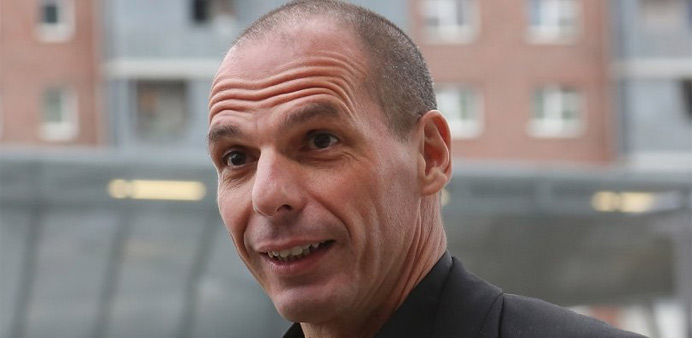AFP/ Athens
Greece's combative finance minister has ruled out a default "accident" and said the new radical left government could put on hold the implementation of some of its campaign promises to build confidence among its creditors.
"We have made all the necessary provisions to ensure there is no accident," Yanis Varoufakis told reporters after a meeting of economic and finance leaders in northern Italy on Friday.
He added that Greece's international creditors would "no doubt do their part" in averting such a scenario, according to an online video of a news conference following the closed-door meeting in Cernobbio, near Lake Como.
Greece is facing a cash squeeze until the summer caused by the non-delivery of promised EU-IMF loans since the radical government came to power in January promising to roll back austerity reforms.
Over 6.0 billion euros ($6.8 billion) become due this month, and over 11 billion must be repaid in July and August.
Greece's creditors have made it clear that no funds remaining in the 240-billion-euro ($252 billion) bailout will be disbursed until Athens presents a credible reform blueprint.
And the European Central Bank has limited the power of Greek banks to assist the state by buying its short-term treasury bills.
To cover the shortage, the government this week submitted a law that directs the cash reserves on pension funds into state debt purchases.
Financial daily Naftemboriki on Saturday reported that pension funds have 2.5 billion euros deposited at the Bank of Greece, and another 1.9 billion in private banks.
Analysts have described the move as "scraping the barrel".
"Varoufakis on Friday again called on the ECB to show "flexibility."
"I've no doubt the ECB is going to do what it takes... to smooth cash flow problems which are very small in the grander scheme of things," he said in Como.
Greece's harshest critic, German Finance Minister Wolfgang Schaeuble warned that a disorderly "Grexident" -- playing on the terms "Grexit" and an accident -- that could push Athens out of the euro could not be excluded.
"To the extent that Greece is solely responsible and decides what is to happen, and we don't know exactly what Greek leaders are doing, we can't exclude it," Schaeuble told Austrian broadcaster ORF.
To appease its sceptical creditors, Greece could postpone some of the reforms on its radical agenda, Varoufakis said.
"Our programme is a programme for four years," he said.
"If this means that for the next few months while there are negotiations we suspend or we delay the implementation of our promises, we shall do precisely that in the context of building trust with our partners," the minister said.
He did not specify the election pledges he had in mind.
Germany and other eurozone nations are sceptical of Athens' plans to raise the minimum wage and facilitate state debtors, but the Greek government insists these measures will help revitalise the country's struggling economy.

